Deck 10: Global Climate Systems
Question
Question
Question
Question
Question
Question
Question
Question
Question
Question
Question
Question
Question
Question
Question
Question
Question
Question
Question
Question
Question
Question
Question
Question
Question
Question
Question
Question
Question
Question
Question
Question
Question
Question
Question
Question
Question
Question
Question
Question
Question
Question
Question
Question
Question
Question
Question
Question
Question
Question
Question
Question
Question
Question
Question
Question
Question
Question
Question
Question
Question
Question
Question
Question
Question
Question
Question
Question
Question
Question
Question
Question
Question
Question
Question
Question
Question
Question
Question
Question

Unlock Deck
Sign up to unlock the cards in this deck!
Unlock Deck
Unlock Deck
1/149
Play
Full screen (f)
Deck 10: Global Climate Systems
1
The two principle climate components are
A) temperature and pressure.
B) temperature and precipitation.
C) precipitation and pressure.
D) pressure and wind speed.
A) temperature and pressure.
B) temperature and precipitation.
C) precipitation and pressure.
D) pressure and wind speed.
B
2
A climate classification based on statistics or other data determined by measurements of observed effects is a(n)
A) empirical classification.
B) genetic classification.
C) combined classification.
A) empirical classification.
B) genetic classification.
C) combined classification.
A
3
Which of the following best describes the difference between weather and climate?
A) Weather is the collective pattern of atmospheric conditions in a given region over long periods of time, whereas climate is the atmospheric conditions at a given time and place.
B) Climate is the collective pattern of atmospheric conditions in a given region over long periods of time, whereas weather is the atmospheric conditions at a given time and place.
C) Weather refers specifically to the temperature of a given place at a given time, whereas climate refers to temperature, humidity, pressure, and wind conditions of a given place at a given time.
D) Climate refers specifically to the temperature of a given place at a given time, whereas weather refers to temperature, humidity, pressure, and wind conditions of a given place at a given time.
E) Weather and climate are essentially the same thing.
A) Weather is the collective pattern of atmospheric conditions in a given region over long periods of time, whereas climate is the atmospheric conditions at a given time and place.
B) Climate is the collective pattern of atmospheric conditions in a given region over long periods of time, whereas weather is the atmospheric conditions at a given time and place.
C) Weather refers specifically to the temperature of a given place at a given time, whereas climate refers to temperature, humidity, pressure, and wind conditions of a given place at a given time.
D) Climate refers specifically to the temperature of a given place at a given time, whereas weather refers to temperature, humidity, pressure, and wind conditions of a given place at a given time.
E) Weather and climate are essentially the same thing.
B
4
As distance from the equator increases, seasonal variation in temperature tends to
A) increase.
B) decrease.
C) remain constant.
A) increase.
B) decrease.
C) remain constant.

Unlock Deck
Unlock for access to all 149 flashcards in this deck.
Unlock Deck
k this deck
5
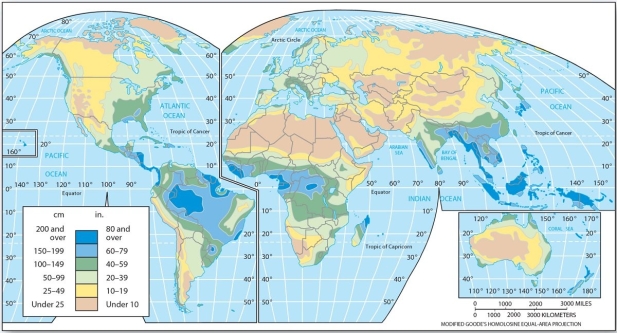
Regarding average annual precipitation, which of the following is correct?
A) The highest amounts occur throughout subtropical latitudes.
B) The drier regions are associated with the eastern portions of major landmasses.
C) The precipitation tends to increase with latitude toward the poles.
D) The highest average values occur along the equator.

Unlock Deck
Unlock for access to all 149 flashcards in this deck.
Unlock Deck
k this deck
6
Which of the following lists the correct, generalized sequence of climates from the equator to the poles?
A) Tropical → Dry → Mesothermal → Microthermal → Highland
B) Tropical → Mesothermal → Dry → Microthermal → Polar
C) Tropical → Dry → Mesothermal → Microthermal → Polar
D) Polar → Microthermal → Dry → Mesothermal → Tropical
E) Dry → Tropical → Mesothermal → Microthermal → Polar
A) Tropical → Dry → Mesothermal → Microthermal → Highland
B) Tropical → Mesothermal → Dry → Microthermal → Polar
C) Tropical → Dry → Mesothermal → Microthermal → Polar
D) Polar → Microthermal → Dry → Mesothermal → Tropical
E) Dry → Tropical → Mesothermal → Microthermal → Polar

Unlock Deck
Unlock for access to all 149 flashcards in this deck.
Unlock Deck
k this deck
7
An empirical classification is based on, among other factors,
A) the interaction of air masses.
B) the origin or genesis of the climate.
C) the mean annual temperature and precipitation of an area.
D) causative factors.
A) the interaction of air masses.
B) the origin or genesis of the climate.
C) the mean annual temperature and precipitation of an area.
D) causative factors.

Unlock Deck
Unlock for access to all 149 flashcards in this deck.
Unlock Deck
k this deck
8
Areas dominated by maritime air masses will be relatively ________, and that those dominated by cT air masses will be relatively ________.
A) wet; wet
B) wet; dry
C) dry; wet
D) dry; dry
A) wet; wet
B) wet; dry
C) dry; wet
D) dry; dry

Unlock Deck
Unlock for access to all 149 flashcards in this deck.
Unlock Deck
k this deck
9
A climate classification based on the geographic determinants of climate, such as latitude or elevation, is an example of a(n)
A) empirical classification.
B) genetic classification.
C) combined classification.
A) empirical classification.
B) genetic classification.
C) combined classification.

Unlock Deck
Unlock for access to all 149 flashcards in this deck.
Unlock Deck
k this deck
10
The annual temperature range of places located in the interior of a continent is ________ those located along the coast at the same latitude.
A) greater than
B) less than
C) the same as
A) greater than
B) less than
C) the same as

Unlock Deck
Unlock for access to all 149 flashcards in this deck.
Unlock Deck
k this deck
11
An area defined by characteristic, long-term weather patterns is called
A) a biome.
B) an average weather place.
C) an ecosystem.
D) a climatic region.
A) a biome.
B) an average weather place.
C) an ecosystem.
D) a climatic region.

Unlock Deck
Unlock for access to all 149 flashcards in this deck.
Unlock Deck
k this deck
12
A genetic classification system can be based on, among other factors,
A) the interaction of air masses.
B) statistics or other data used to determine general categories.
C) mean annual temperature.
D) mean annual precipitation.
A) the interaction of air masses.
B) statistics or other data used to determine general categories.
C) mean annual temperature.
D) mean annual precipitation.

Unlock Deck
Unlock for access to all 149 flashcards in this deck.
Unlock Deck
k this deck
13
A climate classification based on moisture using a water budget approach is an example of a(n)
A) empirical classification.
B) genetic classification.
C) combined classification.
A) empirical classification.
B) genetic classification.
C) combined classification.

Unlock Deck
Unlock for access to all 149 flashcards in this deck.
Unlock Deck
k this deck
14
The study of the climate and its variability, including long-term weather patterns over time and space and the controls thereof is
A) climatology.
B) meteorology.
C) weatherology.
D) weather science.
A) climatology.
B) meteorology.
C) weatherology.
D) weather science.

Unlock Deck
Unlock for access to all 149 flashcards in this deck.
Unlock Deck
k this deck
15
Global circulation patterns of winds and ocean currents, which drive weather systems and, ultimately, climate patterns are created by
A) the coriolis force.
B) frictional force caused by the Earth's spinning on its axis.
C) imbalances created by energy surpluses and deficits at the equator and poles, respectively.
D) the differential heating properties of land and water.
A) the coriolis force.
B) frictional force caused by the Earth's spinning on its axis.
C) imbalances created by energy surpluses and deficits at the equator and poles, respectively.
D) the differential heating properties of land and water.

Unlock Deck
Unlock for access to all 149 flashcards in this deck.
Unlock Deck
k this deck
16
The climate classification system Geosystems uses is based not only on temperature and precipitation measurements, but also causative factors. This is an example of a(n)
A) genetic classification.
B) empirical classification.
C) combined classification.
A) genetic classification.
B) empirical classification.
C) combined classification.

Unlock Deck
Unlock for access to all 149 flashcards in this deck.
Unlock Deck
k this deck
17
World temperature patterns are primarily controlled by the following control except
A) latitude.
B) elevation.
C) continentality.
D) urban heat islands.
A) latitude.
B) elevation.
C) continentality.
D) urban heat islands.

Unlock Deck
Unlock for access to all 149 flashcards in this deck.
Unlock Deck
k this deck
18
Which of the following is an element of weather and climate?
A) insolation
B) temperature
C) atmospheric moisture
D) air pressure
E) insolation, temperature, atmospheric moisture, and air pressure are all elements of weather and climate.
A) insolation
B) temperature
C) atmospheric moisture
D) air pressure
E) insolation, temperature, atmospheric moisture, and air pressure are all elements of weather and climate.

Unlock Deck
Unlock for access to all 149 flashcards in this deck.
Unlock Deck
k this deck
19
A climate classification based on causative factors, such as the interactions of air masses is a(n)
A) empirical classification.
B) genetic classification.
C) combined classification.
A) empirical classification.
B) genetic classification.
C) combined classification.

Unlock Deck
Unlock for access to all 149 flashcards in this deck.
Unlock Deck
k this deck
20
Climate is
A) the weather of a region.
B) the short-term condition of the atmosphere.
C) the long-term atmospheric condition-including extremes that may occur.
D) a reference to temperature patterns only.
A) the weather of a region.
B) the short-term condition of the atmosphere.
C) the long-term atmospheric condition-including extremes that may occur.
D) a reference to temperature patterns only.

Unlock Deck
Unlock for access to all 149 flashcards in this deck.
Unlock Deck
k this deck
21
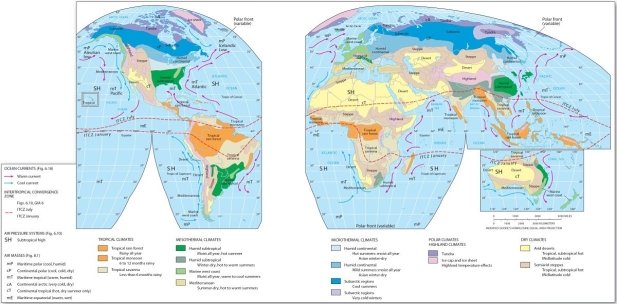
Which air mass appears to predominately influence the humid subtropical region?
A) maritime polar (mP)
B) maritime tropical (mT)
C) continental tropical (cT)
D) continental polar (cP)
E) maritime equatorial (mE)

Unlock Deck
Unlock for access to all 149 flashcards in this deck.
Unlock Deck
k this deck
22
Vegetation in the tropical savanna is
A) lush (thick and green year-round).
B) dominated by grassland.
C) deciduous forest.
D) desert-like succulents.
A) lush (thick and green year-round).
B) dominated by grassland.
C) deciduous forest.
D) desert-like succulents.

Unlock Deck
Unlock for access to all 149 flashcards in this deck.
Unlock Deck
k this deck
23
Which type of vegetation grows in the Mediterranean climate?
A) taiga
B) chaparral
C) rain forest
D) boreal forest
A) taiga
B) chaparral
C) rain forest
D) boreal forest

Unlock Deck
Unlock for access to all 149 flashcards in this deck.
Unlock Deck
k this deck
24
Which of the following is not related to the 98th meridian in the United States?
A) It corresponds closely to the 51 cm (20 in.) isohyet of mean annual precipitation.
B) Tall grass prairies occur to the east of it, and short grass prairies to the west.
C) The area bordering this meridian was originally dominated by native grasses growing in a deep-sod cover.
D) The land is drier to the east of the meridian and wetter to the west.
E) Corn, wheat, and soybean production occur in this area.
A) It corresponds closely to the 51 cm (20 in.) isohyet of mean annual precipitation.
B) Tall grass prairies occur to the east of it, and short grass prairies to the west.
C) The area bordering this meridian was originally dominated by native grasses growing in a deep-sod cover.
D) The land is drier to the east of the meridian and wetter to the west.
E) Corn, wheat, and soybean production occur in this area.

Unlock Deck
Unlock for access to all 149 flashcards in this deck.
Unlock Deck
k this deck
25
Which of the following characterizes a tropical savanna climate?
A) It experiences a summer wet season, and is dominated by the ITCZ for nearly 12 months of the year.
B) The sun's direct rays are overhead (subsolar point) are overhead twice each year.
C) All months receive precipitation in excess of 6 cm (2.4 in.).
D) Its annual temperature variability is less than that of the tropical rain forest.
A) It experiences a summer wet season, and is dominated by the ITCZ for nearly 12 months of the year.
B) The sun's direct rays are overhead (subsolar point) are overhead twice each year.
C) All months receive precipitation in excess of 6 cm (2.4 in.).
D) Its annual temperature variability is less than that of the tropical rain forest.

Unlock Deck
Unlock for access to all 149 flashcards in this deck.
Unlock Deck
k this deck
26
Mediterranean dry-summer climates
A) experience dry conditions in summer due to the subtropical high overhead.
B) experience wet conditions in winter due to the ITCZ overhead.
C) are bordered poleward by steppe climates.
D) experience wet conditions in summer due to the ITCZ overhead.
A) experience dry conditions in summer due to the subtropical high overhead.
B) experience wet conditions in winter due to the ITCZ overhead.
C) are bordered poleward by steppe climates.
D) experience wet conditions in summer due to the ITCZ overhead.

Unlock Deck
Unlock for access to all 149 flashcards in this deck.
Unlock Deck
k this deck
27
A climate that is mesothermal and has a long, hot, dry summer would be designated by which of the following?
A) tropical savanna
B) semiarid steppe
C) Mediterranean
D) humid subtropical hot-summer
E) humid continental hot-summer
A) tropical savanna
B) semiarid steppe
C) Mediterranean
D) humid subtropical hot-summer
E) humid continental hot-summer

Unlock Deck
Unlock for access to all 149 flashcards in this deck.
Unlock Deck
k this deck
28
Which of the following is false regarding the Mediterranean classification?
A) Summers are hot.
B) Seventy percent of the precipitation occurs in the winter months.
C) Summers are influenced by shifting subtropical high cells.
D) The bulk of precipitation occurs in the summer months.
A) Summers are hot.
B) Seventy percent of the precipitation occurs in the winter months.
C) Summers are influenced by shifting subtropical high cells.
D) The bulk of precipitation occurs in the summer months.

Unlock Deck
Unlock for access to all 149 flashcards in this deck.
Unlock Deck
k this deck
29
Tropical climates are typically located
A) straddling the equator between 20° N/S.
B) all areas of the Earth influenced by a subtropical high pressure system.
C) primarily in areas associated with cold ocean currents.
D) higher latitudes influenced by continental tropical air masses.
A) straddling the equator between 20° N/S.
B) all areas of the Earth influenced by a subtropical high pressure system.
C) primarily in areas associated with cold ocean currents.
D) higher latitudes influenced by continental tropical air masses.

Unlock Deck
Unlock for access to all 149 flashcards in this deck.
Unlock Deck
k this deck
30
The dry season in the tropical monsoon climate occurs when
A) cold air masses dominate the region.
B) the ITCZ has moves away from the region.
C) a continental polar air mass influences the region.
D) cold ocean currents shift into the region.
A) cold air masses dominate the region.
B) the ITCZ has moves away from the region.
C) a continental polar air mass influences the region.
D) cold ocean currents shift into the region.

Unlock Deck
Unlock for access to all 149 flashcards in this deck.
Unlock Deck
k this deck
31
Marine west coast climates are dominated by what air masses?
A) continental polar (cP)
B) maritime tropical (mT)
C) continental tropical (cT)
D) maritime polar (mP)
A) continental polar (cP)
B) maritime tropical (mT)
C) continental tropical (cT)
D) maritime polar (mP)

Unlock Deck
Unlock for access to all 149 flashcards in this deck.
Unlock Deck
k this deck
32
The tropical savanna climate has
A) the ITCZ in summer and the subtropical high in winter.
B) the polar front in winter and the subtropical high in summer.
C) the ITCZ all year-round.
D) the polar front all year-round.
A) the ITCZ in summer and the subtropical high in winter.
B) the polar front in winter and the subtropical high in summer.
C) the ITCZ all year-round.
D) the polar front all year-round.

Unlock Deck
Unlock for access to all 149 flashcards in this deck.
Unlock Deck
k this deck
33
The bulk of the Amazon River drainage basin is dominated by which one of the following climate classifications?
A) tropical monsoon
B) tropical savanna
C) tropical rainforest
D) humid subtropical
A) tropical monsoon
B) tropical savanna
C) tropical rainforest
D) humid subtropical

Unlock Deck
Unlock for access to all 149 flashcards in this deck.
Unlock Deck
k this deck
34
The tropical rain forest climate receives most of its rainfall as a result of
A) frontal uplift.
B) orographic uplift.
C) convectional uplift.
D) None of these answer choices are correct.
A) frontal uplift.
B) orographic uplift.
C) convectional uplift.
D) None of these answer choices are correct.

Unlock Deck
Unlock for access to all 149 flashcards in this deck.
Unlock Deck
k this deck
35
The largest percentage of Earth's population lives within the
A) tropical climates.
B) desert climates.
C) mesothermal climates.
D) microthermal climates.
A) tropical climates.
B) desert climates.
C) mesothermal climates.
D) microthermal climates.

Unlock Deck
Unlock for access to all 149 flashcards in this deck.
Unlock Deck
k this deck
36
Which of the following is not true of marine west-coast climates?
A) They are dominated by mP air masses.
B) The air masses in this region are unstable.
C) These climates experience very cold winters because of their high latitude (about 45° to 55° north).
D) The weather is quite unpredictable.
A) They are dominated by mP air masses.
B) The air masses in this region are unstable.
C) These climates experience very cold winters because of their high latitude (about 45° to 55° north).
D) The weather is quite unpredictable.

Unlock Deck
Unlock for access to all 149 flashcards in this deck.
Unlock Deck
k this deck
37
Major ecosystems determined largely by climatic regions and classified largely based on predominant vegetation are called
A) associations.
B) zoogeographic regions.
C) biomes.
D) climate zones.
A) associations.
B) zoogeographic regions.
C) biomes.
D) climate zones.

Unlock Deck
Unlock for access to all 149 flashcards in this deck.
Unlock Deck
k this deck
38
Which of the following is true of microthermal climates?
A) They have a small seasonal temperature range, hence the term microthermal.
B) Because of the latitude at which they occur, these climates occupy the largest land area of any climate.
C) In the Southern Hemisphere, these climates develop only in highland regions.
D) All of the subtypes of this climate have a uniform annual precipitation regime.
A) They have a small seasonal temperature range, hence the term microthermal.
B) Because of the latitude at which they occur, these climates occupy the largest land area of any climate.
C) In the Southern Hemisphere, these climates develop only in highland regions.
D) All of the subtypes of this climate have a uniform annual precipitation regime.

Unlock Deck
Unlock for access to all 149 flashcards in this deck.
Unlock Deck
k this deck
39
Which of the following is not a characteristic of tropical climates?
A) short, though relatively mild, winters
B) consistent day lengths
C) unstable air masses
D) warm ocean temperatures
A) short, though relatively mild, winters
B) consistent day lengths
C) unstable air masses
D) warm ocean temperatures

Unlock Deck
Unlock for access to all 149 flashcards in this deck.
Unlock Deck
k this deck
40
In terms of total land and ocean area, which of the following climate classifications is the most extensive at 36 percent percent of Earth's surface?
A) tropical climates
B) dry climates
C) mesothermal climates
D) microthermal climates
A) tropical climates
B) dry climates
C) mesothermal climates
D) microthermal climates

Unlock Deck
Unlock for access to all 149 flashcards in this deck.
Unlock Deck
k this deck
41
Humid subtropical hot-summer climates receive ________ precipitation during the summer and ________ precipitation in winter.
A) convectional; frontal
B) frontal; convectional
C) orographic; frontal
D) convectional; ITCZ
A) convectional; frontal
B) frontal; convectional
C) orographic; frontal
D) convectional; ITCZ

Unlock Deck
Unlock for access to all 149 flashcards in this deck.
Unlock Deck
k this deck
42
Which of the following is not a causal element of microthermal climates?
A) increasing seasonality
B) latitudinal; effects on temperature
C) very limited continentality
D) cyclonic activity
A) increasing seasonality
B) latitudinal; effects on temperature
C) very limited continentality
D) cyclonic activity

Unlock Deck
Unlock for access to all 149 flashcards in this deck.
Unlock Deck
k this deck
43
Which of the following is not true of tropical and subtropical hot desert climates?
A) In most years, they do not receive any precipitation.
B) Annual average temperatures are above 18°C (64.4°F).
C) They are generally found on the western side of continents.
D) They are under the influence of subtropical high pressure systems.
A) In most years, they do not receive any precipitation.
B) Annual average temperatures are above 18°C (64.4°F).
C) They are generally found on the western side of continents.
D) They are under the influence of subtropical high pressure systems.

Unlock Deck
Unlock for access to all 149 flashcards in this deck.
Unlock Deck
k this deck
44
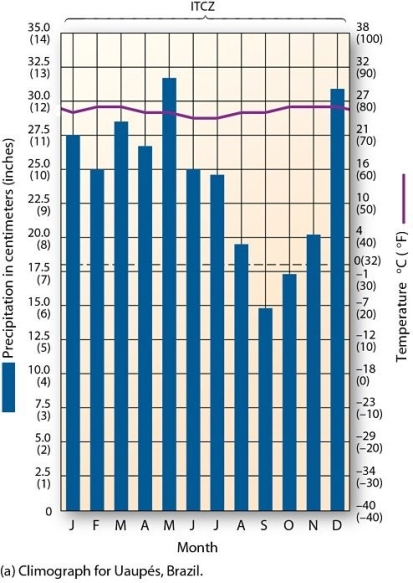
This climograph is characteristic of which climate type?
A) Mediterranean
B) tropical rain forest
C) tropical savanna
D) marine west coast

Unlock Deck
Unlock for access to all 149 flashcards in this deck.
Unlock Deck
k this deck
45
Which of the following is a causal element of polar and highland climates?
A) extremes of daylength between summer and winter
B) high precipitation, primarily in the form of snow
C) low surface albedo due to ground cover
D) high sun altitude during the summer months
A) extremes of daylength between summer and winter
B) high precipitation, primarily in the form of snow
C) low surface albedo due to ground cover
D) high sun altitude during the summer months

Unlock Deck
Unlock for access to all 149 flashcards in this deck.
Unlock Deck
k this deck
46
Which of the following is true regarding humid continental hot-summer and humid continental mild-summer climates?
A) Humid continental mild-summer climates are located further equatorward than humid continental hot-summer climates.
B) Overall, humid continental mild-summer climates receive more precipitation than humid continental hot-summer. climates.
C) Agriculture is not feasible in humid continental mild-summer climates due to the cooler weather, whereas it is very important in humid continental hot-summer climates.
D) Snowfall is notably heavier in humid continental mild-summer climates than in humid continental hot-summer climates and plays an important role in soil moisture recharge.
A) Humid continental mild-summer climates are located further equatorward than humid continental hot-summer climates.
B) Overall, humid continental mild-summer climates receive more precipitation than humid continental hot-summer. climates.
C) Agriculture is not feasible in humid continental mild-summer climates due to the cooler weather, whereas it is very important in humid continental hot-summer climates.
D) Snowfall is notably heavier in humid continental mild-summer climates than in humid continental hot-summer climates and plays an important role in soil moisture recharge.

Unlock Deck
Unlock for access to all 149 flashcards in this deck.
Unlock Deck
k this deck
47
Potential evapotranspiration exceeds precipitation in all parts of which climate type?
A) tropical savanna
B) Mediterranean
C) semiarid steppe
D) humid subtropical winter-dry
A) tropical savanna
B) Mediterranean
C) semiarid steppe
D) humid subtropical winter-dry

Unlock Deck
Unlock for access to all 149 flashcards in this deck.
Unlock Deck
k this deck
48
Which of the following is not a causal element of dry climates?
A) Seasonal influence of the ITCZ.
B) Dry, subsiding air associated with subtropical high pressure systems.
C) Location in the rain shadow of mountains.
D) Cool, stabilizing ocean currents along the western margins of continents.
A) Seasonal influence of the ITCZ.
B) Dry, subsiding air associated with subtropical high pressure systems.
C) Location in the rain shadow of mountains.
D) Cool, stabilizing ocean currents along the western margins of continents.

Unlock Deck
Unlock for access to all 149 flashcards in this deck.
Unlock Deck
k this deck
49
Which of the following is incorrect regarding ice-sheet climates?
A) The climate is dominated by dry, frigid air masses.
B) There is very little precipitation.
C) The only month with an average temperature above freezing corresponds to the summer solstice (June in the Northern Hemisphere, December in the Southern Hemisphere).
D) There are vast expanses that never warm above freezing.
A) The climate is dominated by dry, frigid air masses.
B) There is very little precipitation.
C) The only month with an average temperature above freezing corresponds to the summer solstice (June in the Northern Hemisphere, December in the Southern Hemisphere).
D) There are vast expanses that never warm above freezing.

Unlock Deck
Unlock for access to all 149 flashcards in this deck.
Unlock Deck
k this deck
50
Dry climates are divided into two types according to moisture. These are
A) deserts and steppe.
B) deserts and tundra.
C) steppe and chaparral.
D) chaparral and tundra.
A) deserts and steppe.
B) deserts and tundra.
C) steppe and chaparral.
D) chaparral and tundra.

Unlock Deck
Unlock for access to all 149 flashcards in this deck.
Unlock Deck
k this deck
51
Annual temperature ranges near the southern tip of Greenland, in the Bearing Sea, northern Iceland, South Georgia Island, and northern Norway are low despite their high latitude because
A) the climate is dominated by dry, frigid air masses year-round.
B) they are influenced by maritime environments.
C) higher than average precipitation for the climate type mitigates against the extreme cold weather.
D) they are oriented on sunward side of large topographic features.
A) the climate is dominated by dry, frigid air masses year-round.
B) they are influenced by maritime environments.
C) higher than average precipitation for the climate type mitigates against the extreme cold weather.
D) they are oriented on sunward side of large topographic features.

Unlock Deck
Unlock for access to all 149 flashcards in this deck.
Unlock Deck
k this deck
52
Which of the following has a typical subarctic,very cold winter climate?
A) Churchill, Manitoba
B) Dalian, China
C) Verkhoyansk, Siberia, Russia
D) Duluth, Minnesota
A) Churchill, Manitoba
B) Dalian, China
C) Verkhoyansk, Siberia, Russia
D) Duluth, Minnesota

Unlock Deck
Unlock for access to all 149 flashcards in this deck.
Unlock Deck
k this deck
53
The Amazon equatorial rain forest of South America, which extends from the east coast far into the interior, has developed in response to ________ air masses which travel from ________ in the trade wind belt.
A) cT; NE to SW
B) mT; E to W
C) mT; W to E
D) mP; E to W
A) cT; NE to SW
B) mT; E to W
C) mT; W to E
D) mP; E to W

Unlock Deck
Unlock for access to all 149 flashcards in this deck.
Unlock Deck
k this deck
54
Which climate is characterized by the largest change in monthly average temperatures; i.e., the greatest change in temperatures from one month to the next?
A) boreal forest
B) tundra
C) ice cap
D) dry-midlatitude
A) boreal forest
B) tundra
C) ice cap
D) dry-midlatitude

Unlock Deck
Unlock for access to all 149 flashcards in this deck.
Unlock Deck
k this deck
55
Which of the following is incorrect regarding tundra climates?
A) Spruce, fir and larch trees survive in this climate zone.
B) There is no true summer in this region.
C) Summer temperatures are never higher than 10°C (50°F).
D) The land is under continuous snow cover from 8 to 10 months.
A) Spruce, fir and larch trees survive in this climate zone.
B) There is no true summer in this region.
C) Summer temperatures are never higher than 10°C (50°F).
D) The land is under continuous snow cover from 8 to 10 months.

Unlock Deck
Unlock for access to all 149 flashcards in this deck.
Unlock Deck
k this deck
56
Which climatic region occupies the most extensive area of land on Earth?
A) polar climates
B) dry climates
C) mesothermal climates
D) tropical climates
A) polar climates
B) dry climates
C) mesothermal climates
D) tropical climates

Unlock Deck
Unlock for access to all 149 flashcards in this deck.
Unlock Deck
k this deck
57
Along the periphery of hot deserts, where shifting subtropical high pressure cells create a distinct summer-dry and winter-wet pattern, one finds
A) tropical, subtropical hot steppe climates.
B) marine west coast climates.
C) tropical monsoon climates.
D) humid subtropical hot-summer climates.
A) tropical, subtropical hot steppe climates.
B) marine west coast climates.
C) tropical monsoon climates.
D) humid subtropical hot-summer climates.

Unlock Deck
Unlock for access to all 149 flashcards in this deck.
Unlock Deck
k this deck
58
The low-latitude hot desert climates occur
A) in the tropics and subtropics.
B) only in midlatitude rainshadow positions.
C) in polar regions.
D) along the midlatitude, west coasts of continents.
A) in the tropics and subtropics.
B) only in midlatitude rainshadow positions.
C) in polar regions.
D) along the midlatitude, west coasts of continents.

Unlock Deck
Unlock for access to all 149 flashcards in this deck.
Unlock Deck
k this deck
59
Which of the following is false regarding the tropical rain forest climate?
A) It is influenced by the ITCZ year-round.
B) It does not experience a winter season.
C) The annual temperature range is larger than the daily temperature range.
D) Thunderstorms occur almost daily.
A) It is influenced by the ITCZ year-round.
B) It does not experience a winter season.
C) The annual temperature range is larger than the daily temperature range.
D) Thunderstorms occur almost daily.

Unlock Deck
Unlock for access to all 149 flashcards in this deck.
Unlock Deck
k this deck
60
The only interruption to the distribution of tropical forest climates across equatorial regions are
A) several equatorial deserts caused by rain shadows.
B) the tropical savannas of Africa and South America.
C) the five distinct Mediterranean climates.
D) in highland areas, such as the Andes and Mt. Kilimanjaro.
A) several equatorial deserts caused by rain shadows.
B) the tropical savannas of Africa and South America.
C) the five distinct Mediterranean climates.
D) in highland areas, such as the Andes and Mt. Kilimanjaro.

Unlock Deck
Unlock for access to all 149 flashcards in this deck.
Unlock Deck
k this deck
61
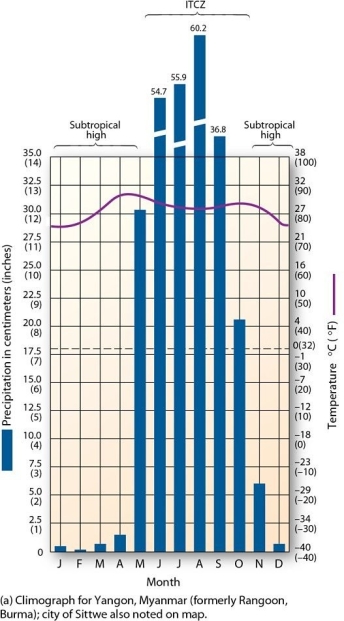
This climograph is characteristic of which climate type?
A) Mediterranean
B) tropical monsoon
C) highland
D) humid subtropical winter-dry

Unlock Deck
Unlock for access to all 149 flashcards in this deck.
Unlock Deck
k this deck
62
Mesothermal climates
A) are essentially seasonless.
B) occupy more land and sea surface area than any other climate region.
C) have a high degree of air mass interaction.
D) are sparsely populated by humans.
A) are essentially seasonless.
B) occupy more land and sea surface area than any other climate region.
C) have a high degree of air mass interaction.
D) are sparsely populated by humans.

Unlock Deck
Unlock for access to all 149 flashcards in this deck.
Unlock Deck
k this deck
63
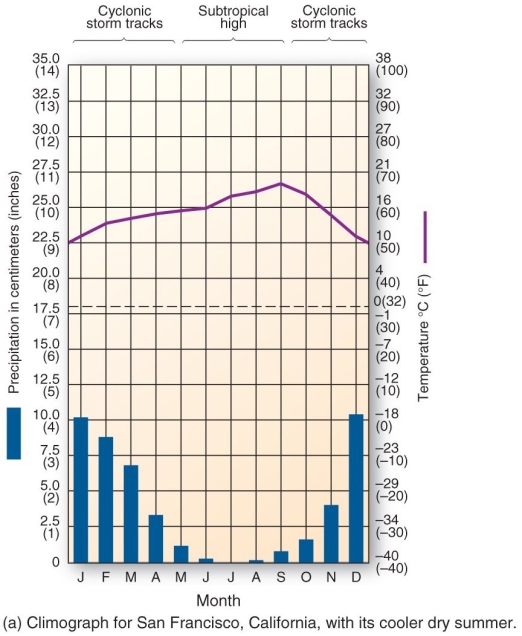
This climograph is characteristic of which climate type?
A) highland
B) tropical monsoon
C) humid subtropical winter-dry
D) Mediterranean

Unlock Deck
Unlock for access to all 149 flashcards in this deck.
Unlock Deck
k this deck
64
Which of the following is false regarding the tropical monsoon climate?
A) It is located along coastal areas.
B) The transition from wet to dry conditions is the result of the shifting of the ITCZ.
C) The wind direction shifts from one time of the year to the next.
D) The summer (high Sun season) is the driest time of the year.
E) Thorn forests occur on the dry margins of this region.
A) It is located along coastal areas.
B) The transition from wet to dry conditions is the result of the shifting of the ITCZ.
C) The wind direction shifts from one time of the year to the next.
D) The summer (high Sun season) is the driest time of the year.
E) Thorn forests occur on the dry margins of this region.

Unlock Deck
Unlock for access to all 149 flashcards in this deck.
Unlock Deck
k this deck
65
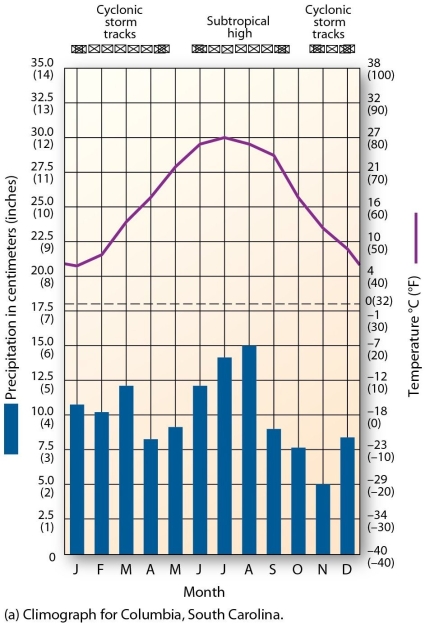
This climograph is characteristic of which climate type?
A) humid subtropical hot-summer
B) tropical rain forest
C) humid subtropical winter-dry
D) humid continental mild-summer

Unlock Deck
Unlock for access to all 149 flashcards in this deck.
Unlock Deck
k this deck
66
The wet season of the tropical monsoon climate of SE Asia occurs during the season of ________ Sun due to the presence of the ________ over the continent. (low Sun = "winter" and high Sun = "summer")
A) low; subtropical high
B) low; ITCZ
C) high; subtropical high
D) high; ITCZ
A) low; subtropical high
B) low; ITCZ
C) high; subtropical high
D) high; ITCZ

Unlock Deck
Unlock for access to all 149 flashcards in this deck.
Unlock Deck
k this deck
67
Which of the following is not true of the subarctic climate regions of Canada and Asia?
A) Permafrost occurs here.
B) Broadleaf deciduous trees, such as maple and sweetgum, dominate the area.
C) The area can experience summer temperatures in the nineties.
D) This climate zone constitutes the maximum poleward extent of forests.
E) This climatic zone experiences exceptionally large annual temperature ranges.
A) Permafrost occurs here.
B) Broadleaf deciduous trees, such as maple and sweetgum, dominate the area.
C) The area can experience summer temperatures in the nineties.
D) This climate zone constitutes the maximum poleward extent of forests.
E) This climatic zone experiences exceptionally large annual temperature ranges.

Unlock Deck
Unlock for access to all 149 flashcards in this deck.
Unlock Deck
k this deck
68
Which is true of humid subtropical winter-dry climates?
A) The wettest summers month receive approximately 2 to 3 times more precipitation than the driest winter month.
B) Few natural hazards occur throughout the humid subtropical winter-dry climates.
C) The winter dry season is related to the seasonal pulse of the monsoons.
D) The "driest" winter months still have at least 7.5 cm (3 inches) of precipitation.
A) The wettest summers month receive approximately 2 to 3 times more precipitation than the driest winter month.
B) Few natural hazards occur throughout the humid subtropical winter-dry climates.
C) The winter dry season is related to the seasonal pulse of the monsoons.
D) The "driest" winter months still have at least 7.5 cm (3 inches) of precipitation.

Unlock Deck
Unlock for access to all 149 flashcards in this deck.
Unlock Deck
k this deck
69
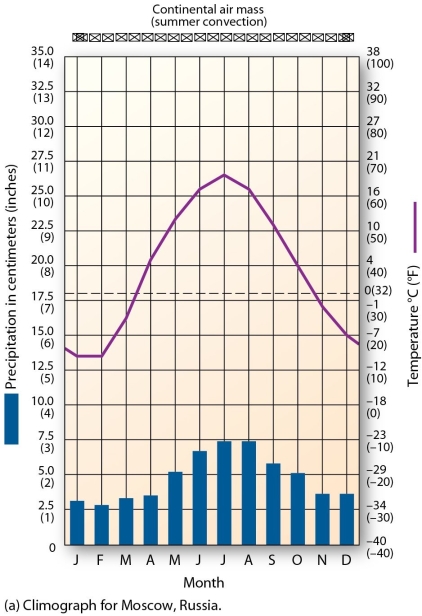
This climograph is characteristic of which climate type?
A) tundra
B) polar maritime
C) humid continental mild-summer
D) midlatitude cold desert

Unlock Deck
Unlock for access to all 149 flashcards in this deck.
Unlock Deck
k this deck
70
Which air masses influence the humid continental hot-summer climates in North America?
A) continental polar (cP) in winter; maritime tropical (mT) in summer
B) continental polar (cP) year-round
C) continental polar (cP) in winter; continental tropical (cT) in summer
D) continental polar in summer (cP) and continental Arctic (cA) in winter.
A) continental polar (cP) in winter; maritime tropical (mT) in summer
B) continental polar (cP) year-round
C) continental polar (cP) in winter; continental tropical (cT) in summer
D) continental polar in summer (cP) and continental Arctic (cA) in winter.

Unlock Deck
Unlock for access to all 149 flashcards in this deck.
Unlock Deck
k this deck
71
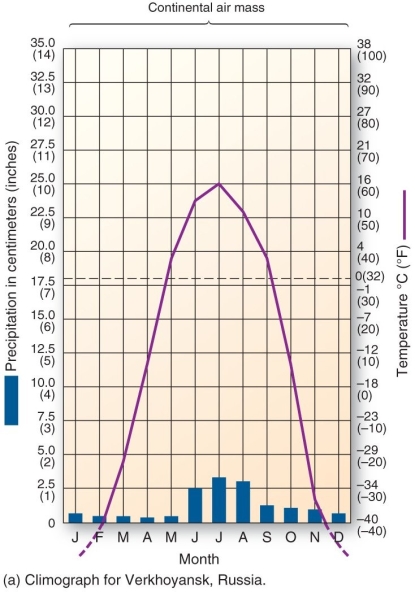
This climograph is characteristic of which climate type?
A) tropical rain forest
B) subarctic cold-winter
C) humid subtropical winter-dry
D) marine west coast

Unlock Deck
Unlock for access to all 149 flashcards in this deck.
Unlock Deck
k this deck
72
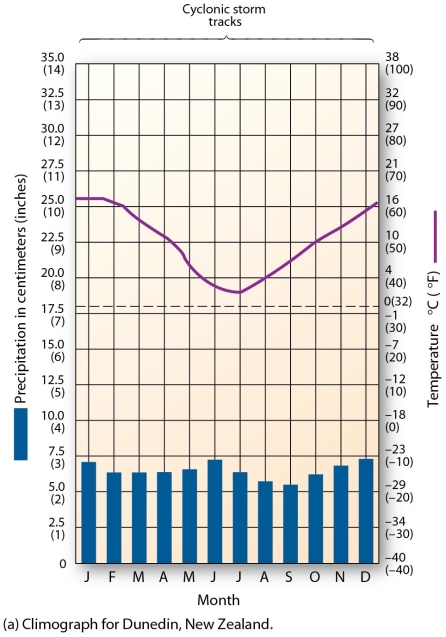
This climograph is characteristic of which climate type?
A) humid continental hot-summer
B) marine west coast
C) humid subtropical winter-dry
D) Mediterranean

Unlock Deck
Unlock for access to all 149 flashcards in this deck.
Unlock Deck
k this deck
73
Humid subtropical hot-summer climates
A) are moist all year.
B) have a pronounced dry period.
C) can either be moist all year or have a pronounced dry period, depending on geographic location.
A) are moist all year.
B) have a pronounced dry period.
C) can either be moist all year or have a pronounced dry period, depending on geographic location.

Unlock Deck
Unlock for access to all 149 flashcards in this deck.
Unlock Deck
k this deck
74
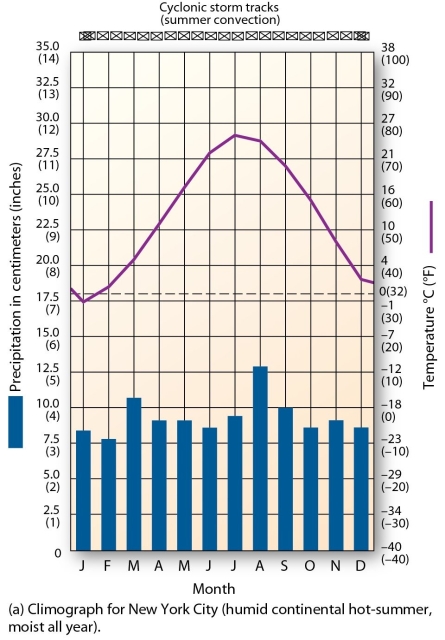
This climograph is characteristic of which climate type?
A) humid continental hot-summer
B) tundra
C) subtropical hot desert
D) Mediterranean

Unlock Deck
Unlock for access to all 149 flashcards in this deck.
Unlock Deck
k this deck
75
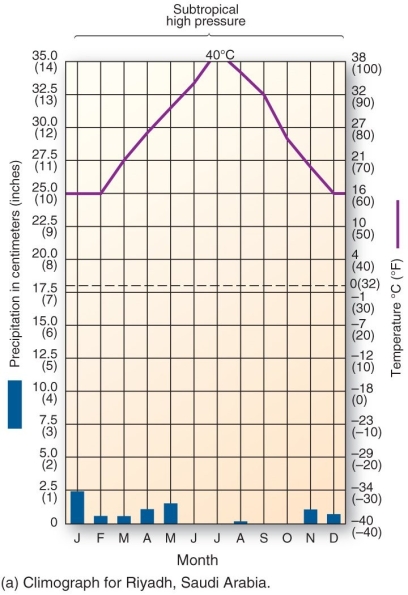
This climograph is characteristic of which climate type?
A) tropical rain forest
B) subtropical hot desert
C) humid subtropical hot-summer
D) marine west coast

Unlock Deck
Unlock for access to all 149 flashcards in this deck.
Unlock Deck
k this deck
76
Which is true of humid subtropical hot-summer climates?
A) Asian humid subtropical hot summer climates are influenced by the monsoons.
B) They have cold ocean currents off shore.
C) North American humid subtropical hot summer climates have cyclonic storm trackshift overhead in the summer.
D) Their hot and rainy season occurs in the winter season.
A) Asian humid subtropical hot summer climates are influenced by the monsoons.
B) They have cold ocean currents off shore.
C) North American humid subtropical hot summer climates have cyclonic storm trackshift overhead in the summer.
D) Their hot and rainy season occurs in the winter season.

Unlock Deck
Unlock for access to all 149 flashcards in this deck.
Unlock Deck
k this deck
77
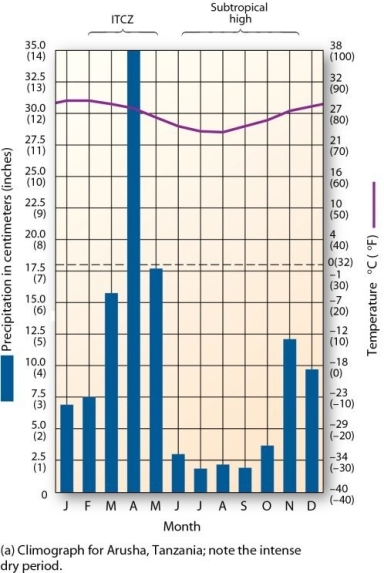
This climograph is characteristic of which climate type?
A) highland
B) tropical rain forest
C) subtropical humid
D) tropical savanna

Unlock Deck
Unlock for access to all 149 flashcards in this deck.
Unlock Deck
k this deck
78
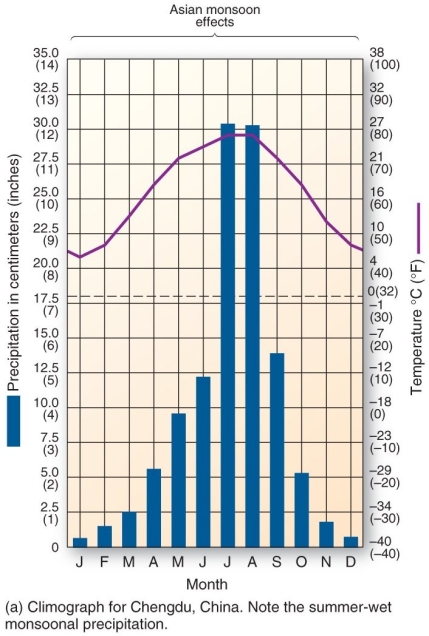
This climograph is characteristic of which climate type?
A) humid subtropical hot-summer
B) tropical monsoon
C) humid subtropical winter-dry
D) Mediterranean

Unlock Deck
Unlock for access to all 149 flashcards in this deck.
Unlock Deck
k this deck
79
Los Angeles, located in a Mediterranean climate zone, is kept ________ during the summer because of the presence of ________.
A) dry; mountains along the western side of the city
B) dry; the cold California current off the coast
C) wet; mountains along the western side of the city
D) wet; the warm California current off the coast
A) dry; mountains along the western side of the city
B) dry; the cold California current off the coast
C) wet; mountains along the western side of the city
D) wet; the warm California current off the coast

Unlock Deck
Unlock for access to all 149 flashcards in this deck.
Unlock Deck
k this deck
80
Humid subtropical hot summer climates in ________; typically experience ________.
A) Asia; dry winters due to monsoonal conditions
B) Asia; wet summers due to cyclonic storm tracks
C) North America; dry winters due to cold ocean currents
D) North America; wet summers due to monsoonal conditions
A) Asia; dry winters due to monsoonal conditions
B) Asia; wet summers due to cyclonic storm tracks
C) North America; dry winters due to cold ocean currents
D) North America; wet summers due to monsoonal conditions

Unlock Deck
Unlock for access to all 149 flashcards in this deck.
Unlock Deck
k this deck


